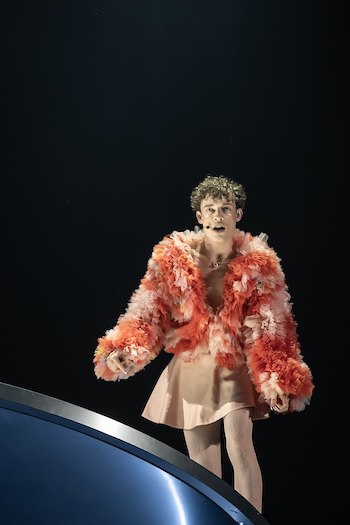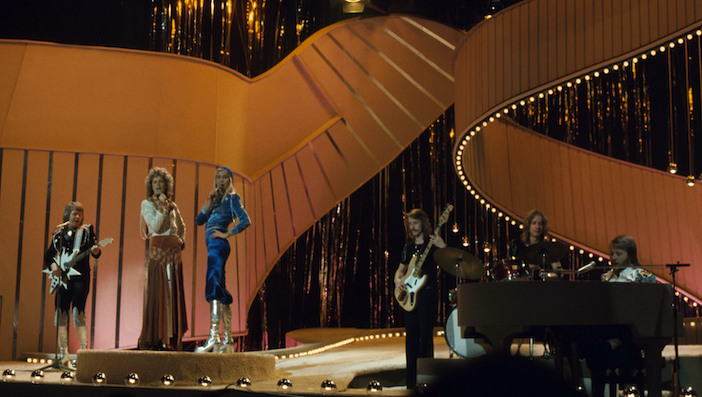Our outspoken ‘on screen’ critic Paul Joyce comes up with another polemic to split opinion, this time on an international institution. As the UK receives a damning nul points from the public this year, Paul gets the knives out on the Eurovision Song Contest…

Nemo performing in the dress rehearsal of the final of Eurovision 2024 (photo courtesy of Creative Commons)
The mess of pottage calling itself The Eurovision Song Contest attracted over 160 million viewers. If everyone who watched, including myself, contributed £1, it would almost match the US Presidential Drawdown Authority (PDA) package, valued at up to £200 million, including capabilities to support Ukraine’ s immediate defence, artillery and anti-tank requirements. Which means that the half dozen or so townships on Ukraine’s northern border currently under continuous fire and now subject to hasty evacuation, might remain in the hands of their rightful owners if this immense tide of TV humanity got off their collective backsides and voted for democracy rather than for Nemo.
Nemo, you may recall, was an adventurous captain invented by the novelist Jules Verne and played on screen by, amongst others, Michael Caine, James Mason, Omar Sharif and Patrick Stewart. But last Saturday night in Malmo in Sweden, on Russia’s very border, an androgenous individual bearing that name and dressed in a skirt and pink bear-like top, lifted a trophy for the country immortalised as the maker of a particular timepiece in Orson Welles’s departing speech in The Third Man, “Don’t be so gloomy. After all it’s not that awful. Like the fella says, in Italy for 30 years under the Borgias they had warfare, terror, murder, and bloodshed, but they produced Michelangelo, Leonardo da Vinci, and the Renaissance. In Switzerland they had brotherly love – they had 500 years of democracy and peace, and what did that produce? The cuckoo clock.”
I’m afraid this Nemo was not on a par with Omar, Michael or Patrick but he did manage to do the equivalent of move whilst chewing gum, in this case singing whilst balancing on what looked like a grant soup plate, both he and it gyrating on stage simultaneously. So, for about four hours or so, I sat alongside 159,999,999 others worldwide with an increasingly descending jaw, watching a man-made light show – which managed even to swamp the Northern Lights taking place close by outside.

ABBA performing at the Eurovision Song Contest 1974
To call this meretricious farrago a song contest when there was barely a single song in evidence out of the final 27 contenders amounts to an act of rape on the English language. It has been seen annually since 1956 and is both the longest-running international music competition, and one of the longest-running TV shows ever. And it is we, here in the UK, who are really to blame for this, for the then Director-General of the BBC, one Sir Ian Jacob, united other members of the European Broadcasting Union at a meeting in Rome in October 1955 in agreeing to a yearly song contest, originally under the title of European Grand Prix. Since then, it is only Covid that managed to displace it from its twelve-monthly outing.
Can you imagine what John Dowland, Ludwig van Beethoven and Franz Schubert would have made of this endless conveyer belt of tuneless rubbish? Far from representing the best of world-wide musical talent, it seems to me to present the worst, most anodyne and unbelievably the least tuneful that each country chooses to bring to the table. And I think this is because it has become a vehicle for testosterone fuelled endless dance routines aimed at almost every sexual preference, all under the guise of imaginative choreography.

Ruslana performing at The Big Eurovision Party (Photo by Nathan Reinds)
This year seemed particularly prone to female performers demonstrating movements of their hips which would put Elvis Presley to shame, as well as warning any potential future partner what they may risk by closer contact. I have to say, however, that in terms of a technical presentation of what is essentially a spectacular light show with incidental music, it is indeed mind-blowing. If I was a director of the Bayreuth Festival, the production team of this year’s spectacular would be my first call.
The whole evening was, in my opinion at least, as objectionable as “The Black and White Minstrel Show” (which employed at least real singers singing real songs) and I hope its demise will be hastened, at least one may hope, by world events. But I frankly doubt this mishmash of junk music will be allowed to go gently into the dark night. There is far too much money to be made from its presentation and execution, and tribal values which at its base are its motivators, show little sign of abating in our current political climate.
The final of the Eurovision Song Contest is currently available to watch on BBC iPlayer.
Photos courtesy of BBC Pictures unless otherwise credited




